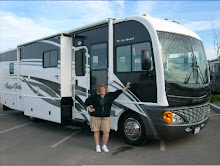I get a lot of questions about towing capacities... While researching the towing capabilities of 1/2 ton vs 3/4 ton trucks and fifth wheel vs. travel trailers, I found a nicely put blurb in the forum on RV Travel by Motor31.
"The limit of what a vehicle can handle both safely and legally is contained in its GVW and GCVW ratings. This is not an issue of brand or model favoritism, it's a matter of what the manufacturer advised DOT and what DOT has certified the vehicle to tow/carry. Look in the owner's manual for the limits of what the vehicle can carry by model and equipment. Having a 4x4 usually means a lower capacity as the extra running gear takes up part of the weight allowance. Some of the variables determining what the vehicle can tow are the frame, brakes, transmission, rear end ratio, 4x4, cab size, bed size, tire capacity, axle capacity and engine type/size. The weakest link in the entire equation determines the max limit of the vehicle. While many feel that the truck's only purpose is to pull or carry, that's not the case. The truck also supplies part of the braking effort and stability of the trailer. The trailer is not balanced to sit on its own wheels in a stable setup. The tow vehicle has to provide that stability so its own load carrying capacity is part of the equation. Trailer brakes are also rather iffy for full stopping effort of the trailer, particularly once they are no longer new and in perfect shape. This is particularly true given the proclivity for manufacturers taking shortcuts in assembly of the components. Using wire twist nuts as opposed to soldering and then sealing the connections from the elements is a good example. Virtually the entire brake system of a trailer is exposed to the elements and any road spray. Most owners also fail to maintain the brakes. You do know that they should be inspected each year at a minimum for function and adjustment. It's also not as robust as a hydraulic system on the tow vehicle. Once the brakes on the trailer fail, and they do fail at times, the entire stopping ability rests on the tow vehicle. The tow vehicle also has to steer the entire combination while on the road. The "bill of goods" I see manufacturers selling is the "demonstrations" of the strength of their vehicles. Showing the truck making a dead lift of a weight more than the truck or stopping a cargo plane are some of the exaggerations they use to advertise their trucks. One of the ones I like the most was the bit about a half ton PU towing a fully loaded semi that is broken down. Think about it: if a half ton would tow a loaded semi (80,000 lbs gross) why would a trucking company spend over $100k to buy a semi tractor? Forget the advertising hype. Forget "opinion" of salesmen and anecdotes of folks who say that the truck can tow anything (or similar statements) as they will not be there if you have a problem later on. It will be you answering questions perhaps in court about what you did and what equipment you operated on the road. You may also be on your own: check your insurance coverage if you tow overloaded. It may well be (probably is) an exclusion of coverage if you do. My entire point is, look at the specs of the vehicles in question. Make sure you have enough truck, by published specs and DOT certification for the load you want to tow. Even non-commercial vehicles are subject to overweight and oversize limits."
Thursday, February 28, 2008
Subscribe to:
Post Comments (Atom)




No comments:
Post a Comment